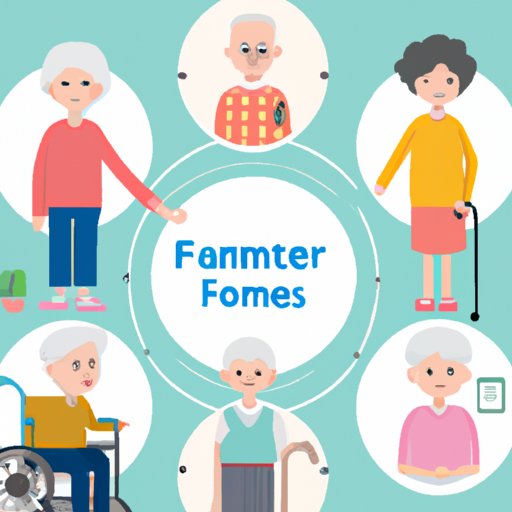Introduction
For many elderly individuals, the thought of leaving their homes can be daunting. Home care for the elderly is a service that offers seniors the opportunity to stay in their own homes while still receiving the care they need. Many families are turning to home care as an alternative to assisted living facilities or nursing homes, as it offers more comfort and independence for their loved ones.
The purpose of this article is to provide an in-depth look at home care for the elderly. We will explore the advantages of home care and provide a guide to choosing the right home care services for your loved one. We’ll also examine how technology is changing home care for the elderly, the benefits of home care vs. assisted living facilities, and how to navigate the costs of home care. Finally, we’ll discuss the important role of family in providing home care for the elderly.
Exploring the Advantages of Home Care for the Elderly
Home care for the elderly has many advantages, both for the senior and their family. Most importantly, it allows the elderly individual to remain in their own home while still receiving the care they need. This helps them maintain their independence and sense of autonomy, which can have a positive impact on their mental health and wellbeing.
In addition to allowing seniors to remain in the comfort of their own home, home care is also often more cost-effective than other types of care. Depending on the level of care needed, home care may be cheaper than assisted living or nursing home care, helping families save money while ensuring their loved one receives the care they need.

A Guide to Choosing the Right Home Care Services for Your Loved One
When choosing home care services for your loved one, it’s important to assess their needs and find the right provider. Start by assessing the type of care your loved one needs, including medical care, personal care, and help with activities of daily living. This will help you determine the type of care they need and the amount of time they will require assistance.
Once you’ve determined the type and amount of care they need, it’s time to find the right home care provider. Ask friends and family for recommendations, and do your research to find a provider that meets your loved one’s needs. When speaking with potential providers, be sure to ask questions such as:
- What type of care do you provide?
- How much experience do your caregivers have?
- Do you offer flexible scheduling?
- Are your caregivers insured and bonded?

How Technology is Changing Home Care for the Elderly
Technology has revolutionized home care for the elderly, making it easier for seniors to receive the care they need in the comfort of their own homes. Automation and robotics, telemedicine, and wearable devices are just some of the ways technology is changing home care.
Automation and robotics are being used to help seniors with tasks such as cooking, cleaning, and medication reminders. Telemedicine is allowing seniors to receive medical care without having to leave their homes, while wearable devices are providing real-time data on seniors’ health and activity levels.
The Benefits of Home Care vs. Assisted Living Facilities
When deciding between home care and an assisted living facility, it’s important to consider the cost, quality of care, and socialization opportunities. Home care is generally less expensive than assisted living, but the quality of care may vary depending on the provider. Assisted living facilities often offer more socialization opportunities, which can be beneficial for seniors who may be isolated at home.
Navigating the Costs of Home Care for the Elderly
The cost of home care for the elderly can vary greatly depending on the type of care needed, the provider, and the location. Insurance plans may cover some or all of the costs of home care, while government programs such as Medicaid may also provide financial assistance. Additionally, there are numerous organizations that offer grants and other forms of financial assistance for home care.

Understanding the Role of Family in Home Care for the Elderly
Family plays an important role when it comes to providing home care for the elderly. Communication is key, as family members should be regularly updated about their loved one’s care. Families should also be available to provide emotional support and education about the different types of home care services available.
Conclusion
Home care for the elderly is an increasingly popular option for seniors who want to remain in the comfort of their own homes while still receiving the care they need. There are many advantages to home care, including independence, comfort, and cost-effectiveness. When choosing home care services, it’s important to assess your loved one’s needs and find the right provider. Technology is also changing home care, making it easier for seniors to receive the care they need. Home care is often more cost-effective than assisted living, and family plays an important role in providing care for their elderly loved ones.
(Note: Is this article not meeting your expectations? Do you have knowledge or insights to share? Unlock new opportunities and expand your reach by joining our authors team. Click Registration to join us and share your expertise with our readers.)
